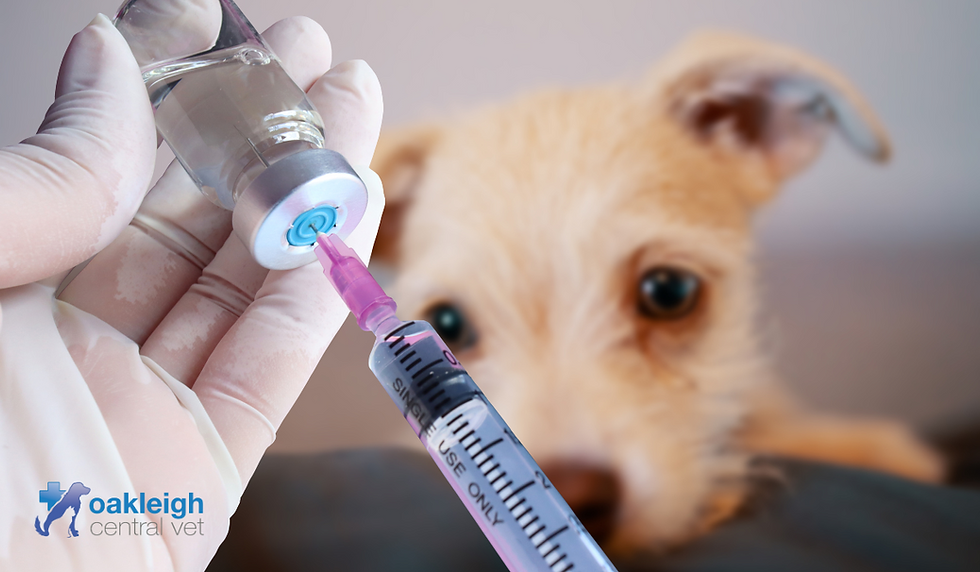Core Vaccines for Dogs—What Every Pet Parent Should Know
- Oct 3, 2025
- 3 min read

Vaccinations are one of the most important parts of keeping your dog healthy. They protect against highly contagious and potentially life-threatening diseases that are still present in Australia today. Even if your dog rarely leaves your backyard, vaccination is vital—not just for your dog’s wellbeing, but also for the health of the wider pet community.
So, what exactly are core vaccines, and why are they so important for your pet?
What Are Core Vaccines?
Core vaccines are the essential vaccinations recommended for all dogs, regardless of breed, age or lifestyle. In Australia, the “C3 vaccine” is considered the minimum standard of protection.
This vaccine covers three serious viral diseases:
1. Canine Parvovirus (Parvo)
A highly contagious virus that attacks the intestines and bone marrow.
Symptoms include severe vomiting, diarrhoea (often bloody), dehydration and rapid decline.
Puppies and unvaccinated dogs are at greatest risk, and without treatment, parvo is often fatal.
Parvo survives for long periods in the environment, making vaccination the only reliable protection.

2. Canine Distemper Virus
Once common, distemper is now less frequent thanks to vaccination—but outbreaks can still occur.
It affects multiple body systems, including the respiratory tract, digestive system, skin and nervous system.
Symptoms can include fever, coughing, vomiting, thick discharge from the eyes and nose, seizures and muscle twitching.
Distemper is often fatal or leaves lasting neurological damage.
3. Canine Adenovirus (Infectious Canine Hepatitis)
A virus that targets the liver, kidneys and eyes.
Symptoms range from mild fever and lethargy to jaundice, abdominal pain and bleeding disorders.
In severe cases, it can progress rapidly and cause sudden death.
Thankfully, vaccination has made this disease rare in Australia—but it hasn’t disappeared completely.
The C5 Vaccine—Extra Protection
While the C3 vaccine is the core, many dogs in Australia also receive a C5 vaccine, which includes protection against two additional diseases:
Canine Parainfluenza Virus
Bordetella bronchiseptica
Together, these are commonly known as “canine cough” (or “kennel cough”). Canine cough spreads easily wherever dogs gather—boarding kennels, dog parks, grooming salons and even on walks. While usually not life-threatening, it causes a harsh cough, reduced appetite, and can make your dog quite unwell.
If your dog will ever be boarded, attend puppy school, or use daycare, a C5 vaccine is generally required.
Puppy Vaccination Schedule
Puppies are especially vulnerable to infectious diseases. Vaccination usually begins at 6–8 weeks of age, with boosters every 3–4 weeks until they’re around 16 weeks old. At Oakleigh Central Vet we have adopted an "early finish" vaccine schedule with the second vaccination given at 10 weeks and 1 day. After this specific vaccine, your puppy will be fully vaccinated and able to socialise shortly afterwards.
After that, adult dogs need regular boosters, with the Canine cough vaccine annually and the C3 vaccine triennially (every 3 years). We recommend all pets to have an annual checkup irrespective of what vaccines are being given to ensure they remain healthy.

Why Vaccination Matters
Protects your pet from severe, often fatal, diseases.
Protects other dogs—herd immunity reduces the spread in the community.
Prevents outbreaks in boarding facilities, shelters and parks.
Keeps vet costs down—treatment for diseases like parvo can run into the thousands, with no guarantee of survival.
Final Thoughts
Core vaccines are not just a one-time puppy job—they’re a lifelong commitment to your dog’s health. By keeping up with vaccinations, you’re giving your best friend the best chance at a long, healthy life.
If you’re unsure when your dog last had their vaccines, book a check-up with our vets. They’ll review your dog’s records and create a tailored vaccination plan.























Comments